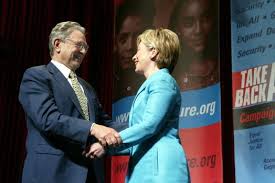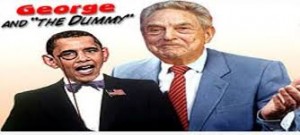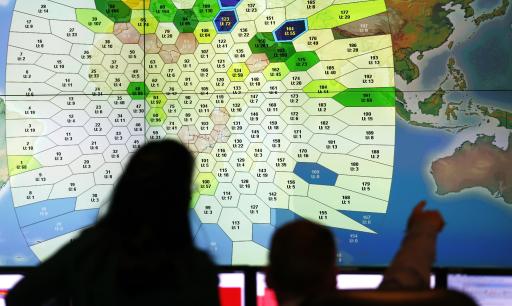Brandon Turbeville
Activist Post
On the first of May, 2014,
Tony Cartalucci of Land Destroyer wrote an article entitled “
Ukrainian Crisis Was Always About Containing Russia,”
where he argued that “NATO's continued existence is hegemonic in nature
- its meddling in Ukraine an act of war against Russia.”
In addition, Cartalucci also wrote that “what we have witnessed over the
past several months is not ‘Russian aggression,’ but the premeditated
destabilization and overthrow of the elected government of Ukraine, and a
resulting, and continuously escalating confrontation with Russia as
Moscow reacts to the reappearance of Nazis along its borders, backed by
NATO and the EU.”
Cartalucci also discussed the importance of the expansion of NATO,
particularly in the context of Ukrainian membership into the
organization as a method of expanding the Anglo-European empire to the
doorstep of Russia on yet another front.
As Cartalucci writes,
So what is NATO doing with Nazi militants in Ukraine? The same thing
Adolf Hitler was doing - establishing "breathing room." While the West
attempts publicly to portray the crisis in Ukraine as Europe reacting to
Russian aggression, behind semi-closed doors they are very open about
their agenda in Ukraine and elsewhere along Russia's peripheries - it is
and always was about the expansion of Europe and the containment of
Russia.
Recently the corporate-funded NATO think tank, the Atlantic Council, celebrated what it called, "anniversaries of crucial importance to the transatlantic community,
including the 25th anniversary of the fall of the Berlin Wall, the 15th
anniversary of NATO's first post-Cold War enlargement, and the 10th
anniversary of the "big bang" enlargements of both the European Union
and NATO." These "enlargements" all took place after the fall of the
Cold War - in other words, after NATO's mandate for existing expired.
Yet the alliance continued to grow, and not only did it grow, in tandem
with the European Union, it did so directly toward Moscow's doorstep
with every intention of eventually absorbing Russia as well.
Of course, Cartalucci was correct in pointing out these aspects of the
U.S.-Russian conflict surrounding the Ukrainian crisis. On one level,
the United States was responsible for the orchestration of a color
revolution inside Ukraine as an attempt to scuttle the warming relations
between Ukraine and Russia, thus forcing Russia to respond.
On another level, the Anglo-European establishment is attempting to
further weaken the geopolitical position of Russia and expand
NATO for purposes of containing and eventually dictating policy and demands to the Russian state.
On another level still, the conflict taking place between the
Anglo-European NATO alliance is the acting out of a script that has been
carefully crafted many years ago with end goal of eliminating the very
existence of national sovereignty from across the globe and the ultimate
creation of a one-world system with a small but dominant minority
reigning at the top of that structure.
One of the architects of the strategy which is currently being
implemented by the United States in regards to foreign policy, Zbigniew
Brzezinski, is thus a logical source of information when one is
attempting to understand the geopolitical movements made by the
Anglo-Europeans, Russians, or Chinese.
It should be remembered that it was Brzezinski who, in his book
The Grand Chessboard: American Primacy and Its Geostrategic Imperatives,
uttered the famous statement that “America is too democratic at home to
be autocratic abroad. This limits the use of America’s power,
especially its capacity for military intimidation. Never before has a
populist democracy attained international supremacy. But the pursuit of
power is not a goal that commands popular passion, except in conditions
of a sudden threat or challenge to the public’s sense of domestic
well-being.”[1]
The book, written in 1997, seemed to lament the fact that the public
would not support such blatant imperialism unless they truly viewed the
crusade to be in their own immediate self-interest. Only fours year
later, the public would receive such a “sudden threat or challenge” to
their “sense of domestic well-being” in the
form of the 9/11 attacks.
However, the
Grand Chessboard
discusses much more than the lack of desire to wage war by the general
public absent a perceived external threat. The book discusses in detail
the various major players in the geopolitical game and the methods they
may use to achieve their goals of hegemony.
When one considers the possibility that the events taking place in
Eastern Europe are much more than the after effects of seemingly
unrelated policy or even those of a series of short-term foreign policy
decisions made by one or two world powers, it becomes vitally important
to seek out the words of the individuals who would have played a role
(and still do play a role) in writing and developing the script
the world is now following.
For instance, in the words of Brzezinski,
As in chess, American global planners must think several moves ahead,
anticipating possible countermoves. A sustainable geostrategy must
therefore distinguish between the short-run perspective (the next five
or so years), the middle term (up to twenty or so years), and the long
run (beyond twenty years). Moreover, these phases must be viewed not as
watertight compartments but as part of a continuum. The first phase must
gradually and consistently lead into the second – indeed, be
deliberately pointed toward it – and the second must then lead
subsequently into the third.[2]
Thus, when Brzezinski speaks of the necessity to not only enlarge NATO
but to eventually assimilate Russia into the confines of greater Europe,
it would be wise to pay attention. Here, in
The Grand Chessboard,
Brzezinski argues that the expansion of NATO and the European Union
will serve to reinvigorate greater Europe as well as act as the
proverbial carrot by which the more Central and Eastern European
countries will be encouraged to facilitate and implement the will of the
Anglo-Europeans. The failure to do so, however, runs the risk of
awakening a historical Russian imperialism that could challenge
Anglo-European hegemony, according to Brzezinski. He writes,
It follows that a wider Europe and an enlarged NATO will serve well both
the short-term and the longer-term goals of U.S. policy. A larger
Europe will expand the range of American influence – and, through the
admission of new Central European members, also increase in the European
councils the number of states with a pro-American proclivity – without
simultaneously create a Europe politically so integrated that it could
soon challenge the United States on geopolitical matters of high
importance to America elsewhere, particularly in the Middle East. A politically defined Europe is also essential to the progressive assimilation of Russia into a system of global cooperation.
Admittedly, America cannot on its own generate a more united Europe –
that is up to the Europeans, especially the French and the Germans – but
America can obstruct the emergence of a more united Europe. And that
could prove calamitous for stability in Eurasia and thus also for
America’s own interests. Indeed, unless Europe becomes more united, it
is likely to become more disunited again. Accordingly, as stated
earlier, it is vital that America work closely with both France and
Germany and seeking a Europe that is politically viable, a Europe that
remains linked to the United States, and a Europe that widens the scope
of the cooperative democratic international system. [3]
[...]
The
enlargement of NATO and the EU would serve to reinvigorate Europe’s own
waning sense of a larger vocation, while consolidating, to the benefit
of both America and Europe, the democratic gains won through the
successful termination of the Cold War. At stake in this effort is
nothing less than America’s long-range relationship with Europe itself. A
new Europe is still taking shape, and if that new Europe is to remain
geopolitically a part of the “Euro-Atlantic” space, the expansion of
NATO is essential. By the same token, a failure to widen NATO, now that
the commitment has been made, would shatter the concept of an expanding
Europe and demoralize the Central Europeans. It could even reignite
currently dormant or dying Russian geopolitical aspirations in Central
Europe.
Indeed, the failure of the American-led effort to expand NATO could
reawaken even more ambitious Russian desires. It is not yet evident –
and the historical record is strongly to the contrary – that the Russian
political elite shares Europe’s desire for a strong and enduring
American political and military presence. Therefore, while the fostering
of an increasingly cooperative relationship with Russia is clearly
desirable, it is important for America to send a clear message about its
global priorities. If a choice has to be made between a larger
Euro-Atlantic system and a better relationship with Russia, the former
has to rank incomparably higher to America.[4]
Brzezinski goes on to describe the framework of an arrangement between
the West and Russia that would have very little – if any – benefits to
Russia. His requirements are essentially that Russia be neutered with
respect to its ability to make effective and influential regional
decisions, that it strategically weaken itself militarily, and even
reorganize its governmental structure to the form of a confederacy with
three co-equal parts. He writes,
For that reason, any accommodation with Russia on the issue of NATO
enlargement should not entail an outcome that has the effect of making
Russia a defacto decision-making member of the alliance, thereby
diluting NATO’s special Euro-Atlantic character while simultaneously
relegating its newly admitted members to second-class status. That would
create opportunities for Russia to resume not only the effort to regain
a sphere of influence in Central Europe but to use its presence within
NATO to play on any American-European disagreements in order to reduce
the American role in European affairs.
It also crucial that, as Central Europe enters NATO, any new security
assurances to Russia regarding the region be truly reciprocal and thus
mutually reassuring. Restrictions on the deployment of NATO troops and
nuclear weapons on the soil of new members can be an important factor in
allaying legitimate Russian concerns, but these should be matched by
symmetrical Russian assurances regarding the demilitarization of the
potentially strategically menacing salient of Kaliningrad and by limits
on major troop deployments near the borders of the prospective new
members of NATO and the EU. While all of Russia’s newly independent
western neighbors are anxious to have a stable and cooperative
relationship with Russia, the fact is that they continue to fear it for
historically understandable reasons. Hence, the emergence of an
equitable NATO/EU accommodation with Russia would be welcomed by all
Europeans as a signal that Russia is finally making the much-desired
postimperial choice in favor of Europe.[5]
Russia’s longer-term role in Eurasia will depend largely on the historic
choice that Russia has to make, perhaps still in the course of this
decade, regarding its own self-definition. Even with Europe and China
increasing the radius of their respective regional influence, Russia
will remain in charge of the world’s largest single piece of real
estate. It spans ten time zones and is territorially twice as large as
either the United States or China, dwarfing in that regard even an
enlarged Europe. Hence, territorial deprivation is not Russia’s central
problem. Rather, the huge Russia has to face squarely and draw the
proper implications from the fact that both Europe and China are already
economically more powerful and that China is also threatening to
outpace Russia on the road to social modernization.
In these circumstances, it should become more evident to the Russian
political elite that Russia’s first priority is to modernize itself
rather than to engage in a futile effort to regain its former status as a
global power. Given the enormous size and diversity of the country, a
decentralized political system, based on the free market, would be more
likely to unleash the creative potential of both the Russian people and
the country’s vast natural resources. In turn, such a more decentralized
Russia would be less susceptible to imperial mobilization. A loosely
confederated Russia – composed of a European Russia, a Siberian
Republic, and a Far Eastern Republic – would find it easier to cultivate
closer economic regulations with Europe, with the new states of Central
Asia, and with the Orient, which would thereby accelerate Russia’s own
development. Each of the three confederated entities would also be more
able to tap local creative potential, stifled for centuries by Moscow’s
heavy bureaucratic hand.[6]
It
is important to note that, when Brzezinski states that a
“decentralized political system, based on the free market,” is desired
for Russia, he means a system that is built on privatization, unfettered
Capitalism, and the ability of private corporations to loot and exploit
“the country’s vast natural resources” as well as its people.
Furthermore, Brzezinski argues that another requirement that West should
impose upon Russia is the acceptance of the increase of the sense of
nationalism among the countries located in its generally accepted sphere
of influence and its national borders. While these countries clearly
have a right to their own self-determination and nationalistic
identities, Brzezinski is referring more to the radicalization and
exploitation of these tendencies than the acceptance of a peoples’ right
to rule themselves free from outside interference. Brzezinski’s
requirement would thus only be accepted by Russia to its own detriment.
In this regard, he states,
A clear choice by Russia in favor of the European option over the
imperial one will be more likely if America successfully pursues the
second imperative strand of its strategy toward Russia: namely,
reinforcing the prevailing geopolitical pluralism in the post-Soviet
space. Such reinforcement will serve to discourage any imperial
temptations. A postimperial and Europe-oriented Russia should actually
view American efforts to that end as helpful in consolidating regional
stability and in reducing the possibility of conflicts along its new,
potentially unstable southern frontiers. But the policy of consolidating
geopolitical pluralism should not be conditioned on the existence of a
good relationship with Russia. Rather, it is also important insurance in
case such a good relationship fails to truly develop, as it creates
impediments to the reemergence of any truly threatening Russian imperial
policy.[7]
Brzezinski also points to the importance of Ukraine to his anti-Russian policy. He writes,
It follows that political and economic support for the key newly
independent states is an integral part of a broader strategy for
Eurasia. The consolidation of a sovereign Ukraine, which in the meantime
redefines itself as a Central European state and engages in closer
integration with Central Europe, is a critically important component of
such a policy, as is the fostering of a closer relationship with such
strategically pivotal states as Azerbaijan and Uzbekistan, in addition
to the more generalized effort to open up Central Asia (in spite of
Russian impediments) to the global economy.
Large-scale international investment in an increasingly accessible
Caspian – Central Asian region would not only help to consolidate the
independence of its new countries but in the long run would also benefit
a postimperial and democratic Russia. The tapping of the region’s
energy and mineral resources would generate prosperity, prompting a
greater sense of stability and security in the area, while perhaps also
reducing the risks of Balkan-type con-external investment, would also
radiate to the adjoining Russian provinces, which tend to be
economically underdeveloped. Moreover, once the region’s new ruling
elites come to realize that Russia acquiesces in the region’s
integration into the global economy, they will become less fearful of
the political consequences of close economic relations with Russia. In
time, a nonimperial Russia could thus gain acceptance as the region’s
preeminent economic partner, even though no longer its imperial
ruler.[8]
It must be remembered that Brzezinski, when discussing the “choices”
available to Russia in terms of its place in the world, stated that
Russia would “either [choose]to be a part of Europe as well or
[choose]to become a Eurasian outcast, neither truly of Europe nor Asia
and mired in its ‘near abroad’ conflicts.”[9]
Notice
that, in this statement, the choices provided to Russia by Brzezinski’s
philosophy are between total fealty to the European Soviet and total
irrelevance. No self-respecting nation would choose either of these two
options for its future and this is a fact that Brzezinski is undoubtedly
aware of. Thus, it is clear that the Russians are being faced with the
non-choice that is the Brzezinski doctrine, a philosophy that, when put
into practice, makes conflict virtually inevitable.
Russia is thus faced with the choice of willing subservience or a
growing NATO and Europe that will inevitably come knocking on its door
for “access” to its vast oil and mineral wealth and demand that whatever
political clout it may have in the world be erased.
These types of requirements and conditions cannot help but initiate a direct confrontation.
Notes:
[1] Brzezinski, Zbigniew.
The Grand Chessboard: American Primacy And Its Geostrategic Imperatives. Basic Books. 1997. Pp. 40-41
[2] Brzezinski, Zbigniew.
The Grand Chessboard: American Primacy And Its Geostrategic Imperatives. Basic Books. 1997. P.198.
[3] Brzezinski, Zbigniew.
The Grand Chessboard: American Primacy And Its Geostrategic Imperatives. Basic Books. 1997. P. 199.
[4] Brzezinski, Zbigniew.
The Grand Chessboard: American Primacy And Its Geostrategic Imperatives. Basic Books. 1997. Pp. 200-201.
[5] Brzezinski, Zbigniew.
The Grand Chessboard: American Primacy And Its Geostrategic Imperatives. Basic Books. 1997. P. 201.
[6] Brzezinski, Zbigniew.
The Grand Chessboard: American Primacy And Its Geostrategic Imperatives. Basic Books. 1997. P. 202.
[7] Brzezinski, Zbigniew.
The Grand Chessboard: American Primacy And Its Geostrategic Imperatives. Basic Books. 1997. P. 202-203.
[8] Brzezinski, Zbigniew.
The Grand Chessboard: American Primacy And Its Geostrategic Imperatives. Basic Books. 1997. P. 203.
[9] Brzezinski, Zbigniew.
The Grand Chessboard: American Primacy And Its Geostrategic Imperatives. Basic Books. 1997. P.122
Recently from Brandon Turbeville:
Brandon Turbeville is an author out of Florence, South Carolina. He
has a Bachelor's Degree from Francis Marion University and is the author
of six books, Codex Alimentarius -- The End of Health Freedom, 7 Real Conspiracies, Five Sense Solutions and Dispatches From a Dissident, volume 1 and volume 2, and The Road to Damascus: The Anglo-American Assault on Syria. Turbeville
has published over 300 articles dealing on a wide variety of subjects
including health, economics, government corruption, and civil liberties.
Brandon Turbeville's podcast Truth on The Tracks can be found every
Monday night 9 pm EST at UCYTV. He is available for radio and TV interviews. Please contact activistpost (at) gmail.com.








